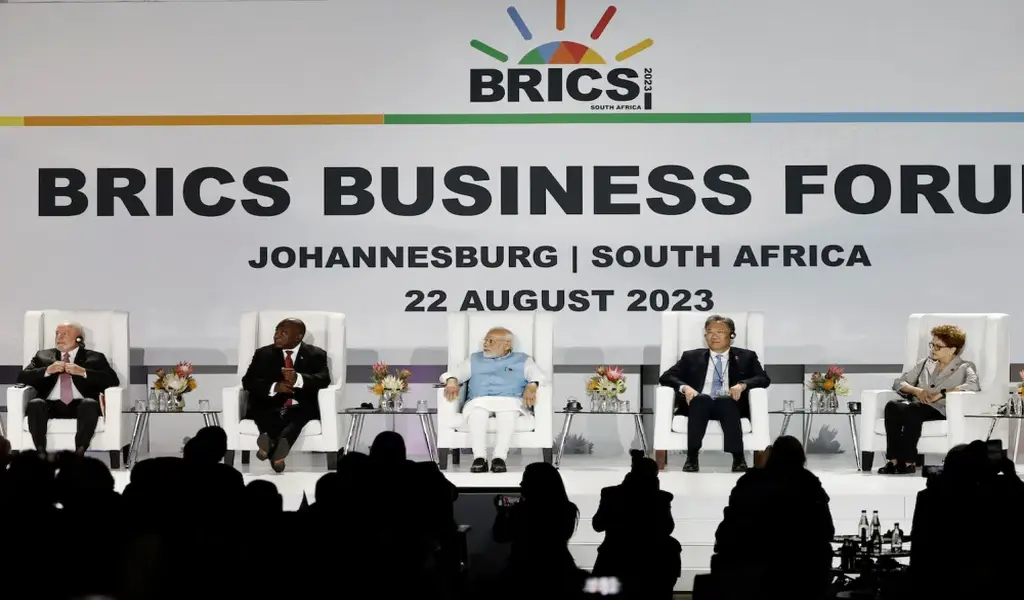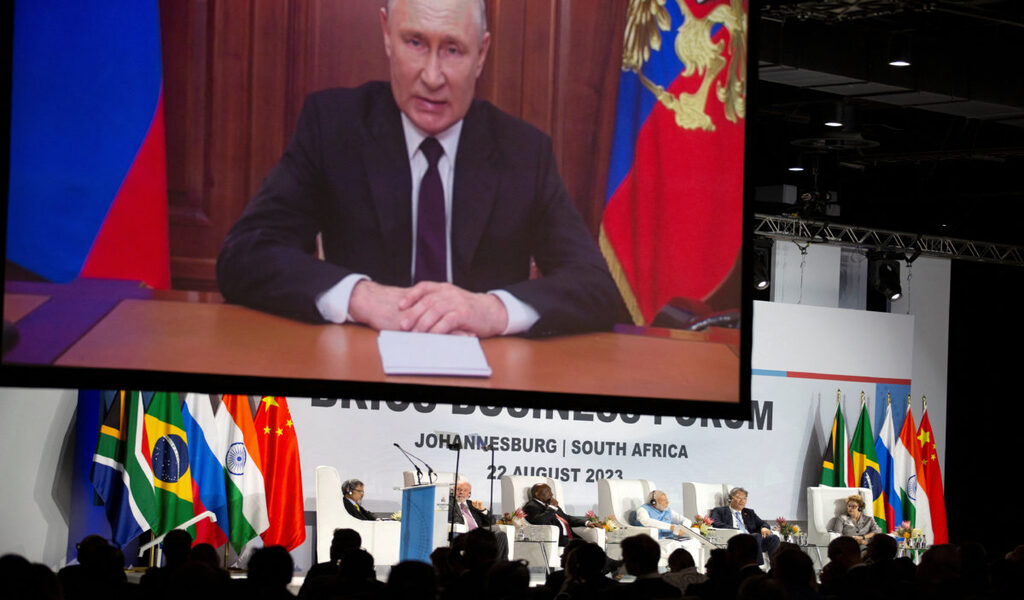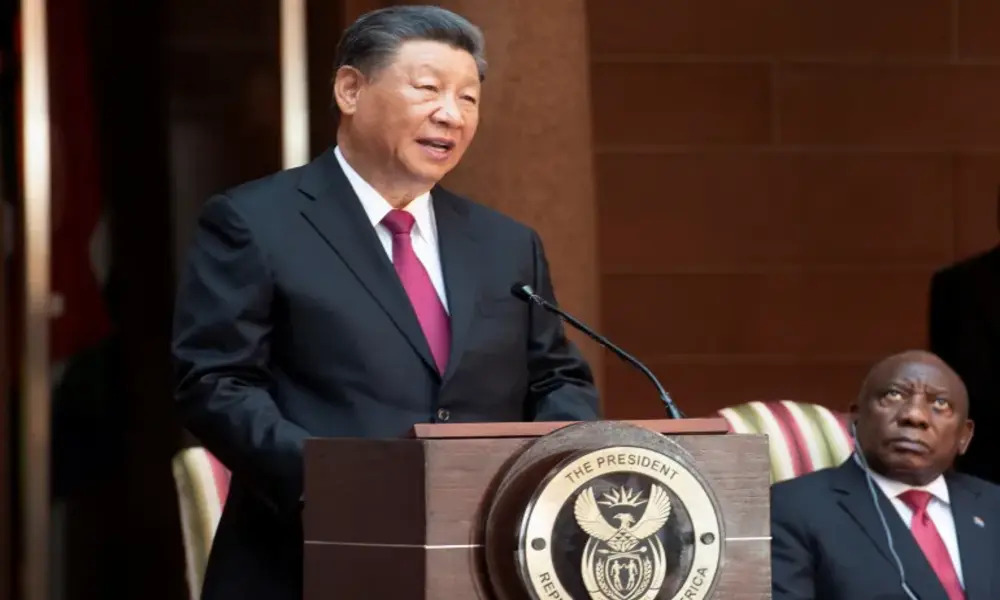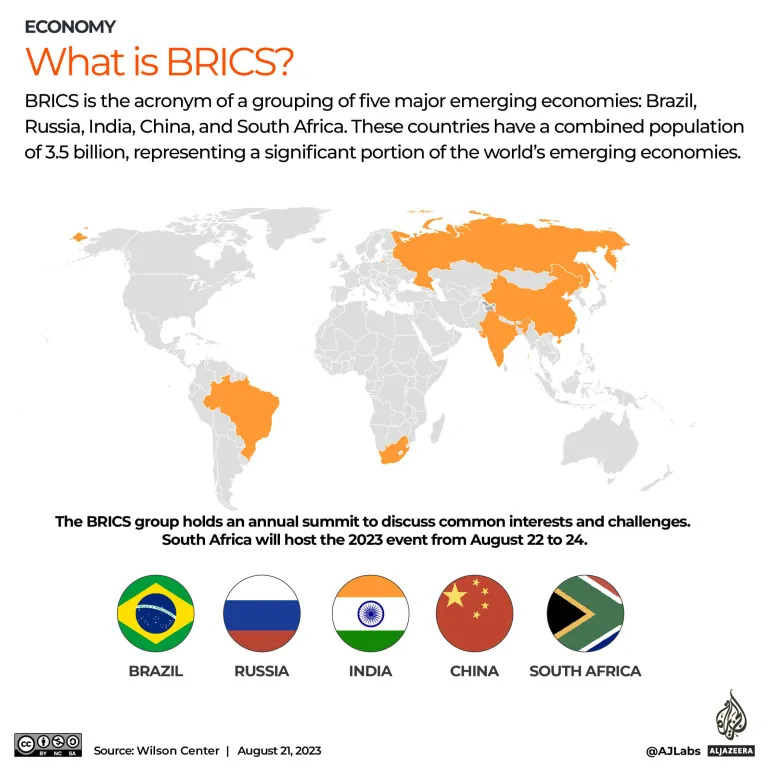News
BRICS Summit 2023: Developing Nations’ Leaders Address Expansion And Global Dynamics

(CTN NEWS) – Leaders from five developing nations, collectively representing nearly half of the world’s population, are set to assemble in Johannesburg on Tuesday for the 15th BRICS Summit.
This gathering will focus on a range of significant topics, including the expansion of the emerging market coalition, the ongoing conflict in Ukraine, and the states of affairs with Western nations.
Presided over by South African President Cyril Ramaphosa, the current head of BRICS, the summit will bring together esteemed figures such as Chinese President Xi Jinping, Brazilian President Luiz Inácio Lula da Silva, Indian Prime Minister Narendra Modi, and Russian Foreign Minister Sergei Lavrov.
Russian President Vladimir Putin, however, will participate virtually due to his current status as the subject of an arrest warrant issued by the International Criminal Court for alleged war crimes.
This development results in his absence from the physical meeting, as South Africa, a signatory of the ICC, would have been legally obligated to execute the warrant had Putin set foot on its soil.
Ramaphosa extended invitations to 67 leaders hailing from Africa, Latin America, the Middle East, Asia, and the Caribbean, welcoming them to partake in the summit.
Interestingly, no leaders from Western nations were included in the guest list. Notably, the U.N. secretary-general, the chair of the African Union Commission, and the president of the New Development Bank were among the invitees.
Additionally, more than a dozen other esteemed dignitaries and a multitude of business leaders were also granted the honor of attending.
Prospects and Challenges in the Potential Expansion of BRICS: Preparing for Summit Deliberations
A key focal point of the upcoming summit will revolve around the potential expansion of BRICS.
Over 40 countries have conveyed their interest in joining this consortium, encompassing influential economic centers and emerging geopolitical forces such as Nigeria, Saudi Arabia, and Iran.
Formally, a total of 23 nations have submitted applications for BRICS membership. This list includes Saudi Arabia, Iran, the UAE, Argentina, Indonesia, Egypt, and Ethiopia.
In a more informal capacity, prominent African players like Nigeria and Ghana have expressed their interest, although they have not yet taken the step of submitting a formal application.
This landscape underscores the tentative nature of numerous expressions of interest, underscoring the intricate tightrope that many nations are navigating as they seek to bridge a perceived global divide.
Gustavo de Carvalho, a seasoned policy analyst and senior researcher at the South African Institute of International Affairs, anticipates that the summit’s discussions over the course of two days are unlikely to yield definitive decisions regarding new members.
However, the primary objective will be to establish a well-defined procedure, set of criteria, and a timeframe governing the submission and approval of applications.
Speaking to CNBC from Johannesburg, de Carvalho highlighted the divergence of opinions among the existing members of this cooperative yet adaptable coalition regarding its expansion.

A recorded message from Russian president Vladimir Putin is aired during the opening remarks at the BRICS Summit in Johannesburg, South Africa August 22, 2023 REUTERS/James Oatway
BRICS Expansion Dynamics: Perspectives of Member Nations and Shared Concerns
Regarding the matter of expansion within BRICS, de Carvalho elaborated on the dynamics among member nations.
He noted that historically, India has harbored the most concerns about the idea of expansion, primarily due to apprehensions that it could lead to an amplification of Chinese influence within the bloc.
Conversely, Russia, grappling with international isolation, has become notably vocal in embracing the notion of expansion.
De Carvalho also highlighted Brazil’s evolving stance on expansion.
While the country initially maintained a neutral position, the Lula administration has raised reservations about the potential dilution of the group’s cohesiveness, fearing it could compromise its ability to present a unified standpoint.
In a significant development, South African President Ramaphosa openly endorsed expansion, particularly for fellow African nations.
This marks the first time he has explicitly voiced support for such a move, especially in the context of ongoing “BRICS+” discussions among emerging economies.
Against the backdrop of Western sanctions targeting Russia in response to its Ukraine incursion—specifically the freezing of Russian assets—de Carvalho underscored the shared interest among BRICS and affiliated countries in minimizing risk exposure within the international financial system.
This collective concern has spurred discussions on bolstering currency stability and liquidity positions as a collaborative effort.
Shifting Dynamics in Russian and Chinese Stance within BRICS
Over the past year, Russian and Chinese officials have increasingly adopted an anti-Western stance in their portrayal of the BRICS coalition.
This positioning aims to garner support for a wide-ranging alliance aimed at challenging the prevailing U.S. dominance in the global political and economic framework.
While certain analysts have suggested the possibility of a pronounced anti-Western shift within BRICS, South Africa, India, and Brazil have indicated their intention to maintain closer connections with their traditional Western partners.
According to de Carvalho, this underscores the enduring autonomy of individual member countries in prioritizing their diplomatic and international trade interests.
Certain reports have highlighted Chinese officials’ efforts to position BRICS as a direct geopolitical contender to the G7. However, in a televised address, President Ramaphosa asserted South Africa’s refusal to be pulled into a power struggle between global forces.
He emphasized the country’s determination to remain independent in a world characterized by increasing divisions into opposing factions.
The BRICS alliance operates on a foundation of consensus and typically collaborates on areas where their economic interests intersect, rather than pursuing a unilateral “alliance,” as outlined by de Carvalho.
In this context, Ramaphosa’s speech holds particular significance in clarifying Pretoria’s aspiration for a positive rapport with Western nations, distinct from any notion of a collective pivot against the West.
While BRICS members frequently engage in bilateral agreements and collaborative efforts, de Carvalho has raised a counterpoint to the notion of a unanimous drive to directly challenge the G7.
According to his perspective, the primary objective is to collectively advocate for the interests of the five nations that collectively encompass approximately 40% of the world’s population.
Challenging the Dominance of the G7: BRICS’ Vision for Global Dynamics
This standpoint is grounded in the conviction that international political dynamics should not be monopolized solely by a select group of seven major industrialized economies, of which both India and China could conceivably be constituents.
“It’s not a matter of reshaping the global order; it’s more about acknowledging that the global order has already undergone changes. However, our collective voice is still far from the level we believe is necessary for influencing global decisions,” de Carvalho expressed.
He elaborated, “This isn’t merely a case of countries from the global south expressing discontent with the Western role; it’s primarily tied to their perception of their own capabilities and the influence they should rightfully possess.”
De Carvalho emphasized that BRICS members don’t always see eye to eye, and they don’t view the group as a comprehensive solution. Instead, they see it as a conduit to enhance their influence in international dialogues.
“In my view, BRICS would not supplant the G7, but I wouldn’t be surprised if, perhaps in the next few years, a productive step would be to initiate meetings between BRICS and the G7,” he noted.
However, Steven Gruzd, who heads the African governance and diplomacy program at the SAIIA, offered a differing perspective to CNBC on Monday.
He asserted that BRICS is already a contender against the G7, having established itself as a prominent voice representing emerging economies.
Gruzd elaborated, “The G7 comprises affluent Western economies, whereas BRICS encompasses the two most populous countries and leading nations on three continents. Both groups seek influence and backing on the global stage. Whether this rivalry escalates into geopolitics remains to be observed.”
“In the wake of Russia’s incursion into Ukraine, we’ve witnessed a world division into three factions: pro-West, pro-Russia-and-China, and non-aligned. I believe these divisions are poised to persist and intensify, particularly as non-aligned nations face mounting pressure to align with the other groups,” Gruzd concluded.
Dynamics and Realities of BRICS: Beyond Common Misconceptions
While the prevailing narrative around BRICS often highlights the escalating influence of China and Russia in emerging economies, de Carvalho argued against the misconception that China wields “limitless influence” within other BRICS nations, asserting that this assumption is “certainly not accurate.”
He emphasized the significant role of competition and tensions with India within the dynamics of BRICS. Particularly, he pointed out that the rivalry between China and India shapes the group’s interactions, fueled by Indian concerns about China’s growing sway within the coalition.
The autonomy of BRICS countries to navigate global issues according to their own trajectories was demonstrated notably in their responses to Russia’s Ukraine conflict. De Carvalho highlighted this as an opportunity for BRICS nations to potentially serve as intermediaries for dialogue.
South Africa and China, for instance, conducted separate discussions with Moscow and Kyiv, aiming to facilitate negotiations.
Simultaneously, India and Brazil condemned the aggression while advocating for a diplomatic resolution, rather than fully aligning with the Western stance on Ukraine.
Additionally, India engaged with the United States in opposing what they perceive as Chinese assertiveness in the Indo-Pacific region.
De Carvalho underlined that it’s crucial to recognize what BRICS is not: an alliance akin to NATO or any other global coalition. He stressed that none of the member countries perceive BRICS as such.
He expressed his hope that the upcoming summit would foster more nuanced discussions about BRICS’ nature and its limitations.
Such discussions, he believed, would benefit the international community by providing a clearer understanding of the institution and how to effectively engage with it.
RELATED CTN NEWS:
Thailand’s Q2 Economic Growth At 1.8% Amid Export Challenges and Tourism Resilience
Fukushima Nuclear Plant To Begin Release Of Treated Radioactive Water On August 24th































